#granite piers
Explore tagged Tumblr posts
Photo

Boston Landscape An illustration of a large, eclectic, full-sun courtyard stone garden path in the summer can be seen here.
#boston landscapes#granite curbing#boston#granite piers#granite paving#endless summer hydrangea#landscape
0 notes
Photo

Boston Landscape An illustration of a large, eclectic, full-sun courtyard stone garden path in the summer can be seen here.
#city living#granite piers#granite curbing#david austin roses#boston#granite paving#endless summer hydrangea
0 notes
Photo

Landscape Boston Photo of a broad, eclectic courtyard with a stone walkway in the summer sun.
0 notes
Photo

Photo of a large eclectic full sun courtyard stone garden path in summer.
0 notes
Photo

Concrete Pavers in New York A summertime photo of a sizable traditional concrete paver driveway in the front yard with partial sun.
0 notes
Photo

Driveway (Boston)
#Ideas for a sizable gravel driveway with full coastal sun. banding#gravel drive#granite#driveway#pier#grass#peastone
0 notes
Text

Downy Woodpeckers Brooklyn Bridge Park, Pier 1 Top of Granite Prospect.
#birds#birding#urban birding#nuts_about_birds#birdstagram#patch birding#nature blogger#nyc nature#brooklyn#brooklyn bridge park#nyc#nature#woodpecker#pájaro carpintero#downy woodpecker
151 notes
·
View notes
Text

new youtube video xx
must have restaurants for every sims 4 world showcase! these are all no cc lots that can be found on the gallery.
lot details:
willow creek - hot n' greasy by loquatrooster
oasis springs- the flaming kabob by bearhugs2011
newcrest- 9 golden tigers by loquatrooster
granite falls- granite falls diner by misssimreno
magnolia promenade - benji's breakfast café by loquatrooster
windenburg- sushi sims by wiynki
san myshuno- skybar rooftop restaurant by favupigbuilding
forgotten hollow - fang's vampire diner by chaubin_806
brindleton bay- seaside food market by alexandrafd87
selvadorada- jungle restaurant by sweetandsyrupy
strangerville- strangerville food market by gravysims
del sol valley- gourmet restaurant by paszerine
sulani- waterfront restaurant by simcubeez
glimmerbrook- spellcaster pub by meepacheepa
britechester- brunch & study café by simcubeez
evergreen harbor- the caboose by misssimreno
mt. komorebi- asia takeaway restaurant by flubber32c4
henford-on-bagley- cozy cottage restaurant by brendamaureen
tartosa- italian restaurant by sweetandsyrupy
moonwood mill- moonwood mill food truck by ralucii
copperdale- copperdale diner by lilo_1802
san sequoia- pier 32 by catsaar
chestnut ridge- steakhouse restaurant by marmeladart
tomarang- tomarang restaurant by brunasouzag
thanks to all of the amazing creators for these lots!
love ya'll xx
149 notes
·
View notes
Text
Visiting Whitby with Mina Murray
Last year I illustrated Mina's description of Whitby a selection of modern photos. This year, I thought I might go one better, so here are some views of Whitby as Mina might have seen it in the 1890s*.
[*or as close as I could manage.]
"This is a lovely place. The little river, the Esk, runs through a deep valley, which broadens out as it comes near the harbour."

"A great viaduct runs across, with high piers, through which the view seems somehow further away than it really is."
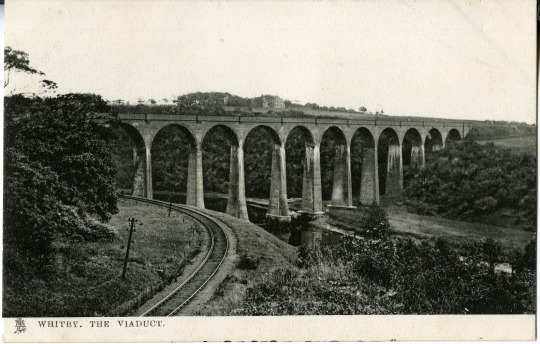
[I don't actually know the age of this photo, but it looks about right.]
"The valley is beautifully green, and it is so steep that when you are on the high land on either side you look right across it, unless you are near enough to see down."
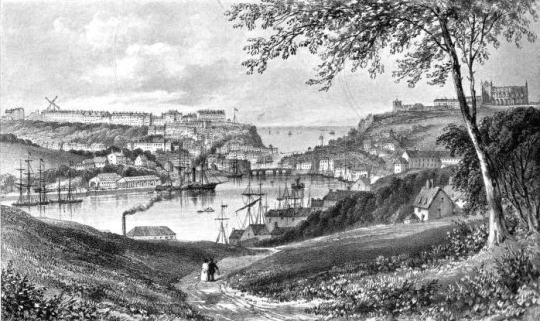
"The houses of the old town—the side away from us—are all red-roofed, and seem piled up one over the other anyhow..."
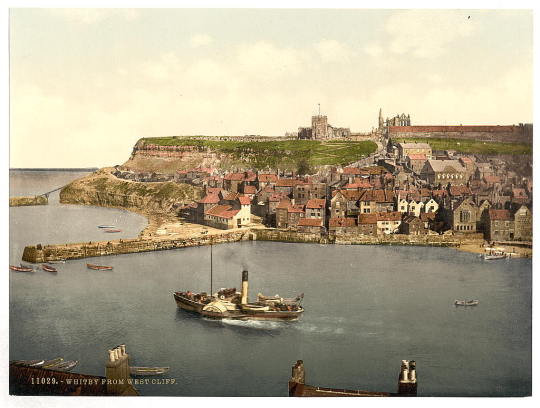
"... like the pictures we see of Nuremberg."
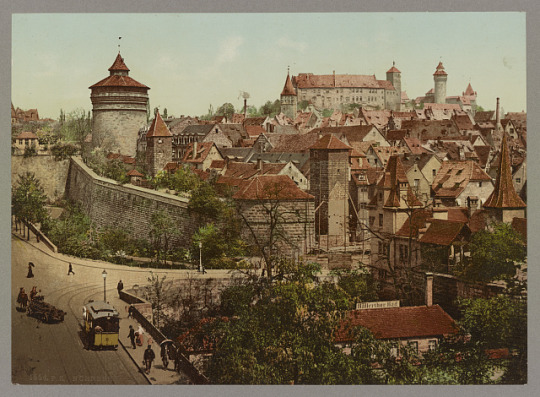
[this is Nuremberg sometime between 1890 and 1906]
"Right over the town is the ruin of Whitby Abbey, which was sacked by the Danes, and which is the scene of part of "Marmion," where the girl was built up in the wall."

"It is a most noble ruin, of immense size, and full of beautiful and romantic bits; there is a legend that a white lady is seen in one of the windows."

"Between it and the town there is another church, the parish one, round which is a big graveyard, all full of tombstones."
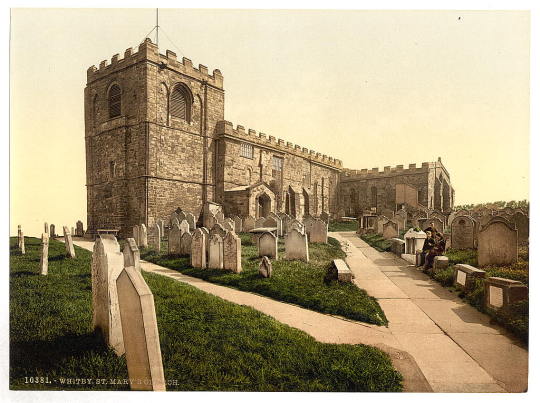
"This is to my mind the nicest spot in Whitby, for it lies right over the town, and has a full view of the harbour and all up the bay to where the headland called Kettleness stretches out into the sea."

"It descends so steeply over the harbour that part of the bank has fallen away, and some of the graves have been destroyed. In one place part of the stonework of the graves stretches out over the sandy pathway far below. There are walks, with seats beside them, through the churchyard; and people go and sit there all day long looking at the beautiful view and enjoying the breeze."
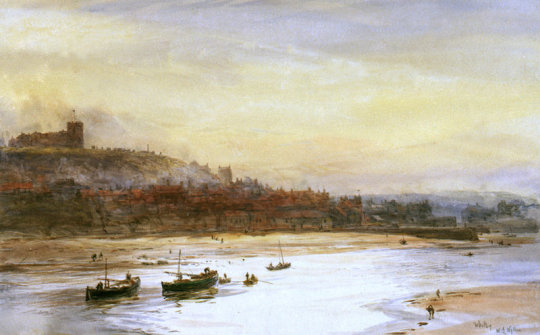
[this painting by William Lionel Wyllie is from 1922, so a bit later, but I thought it was too pretty not to include. St Mary's and the graveyard are at the top left, and you can see the steep descent below.]
"The harbour lies below me, with, on the far side, one long granite wall stretching out into the sea, with a curve outwards at the end of it, in the middle of which is a lighthouse. A heavy sea-wall runs along outside of it. On the near side, the sea-wall makes an elbow crooked inversely, and its end too has a lighthouse. Between the two piers there is a narrow opening into the harbour, which then suddenly widens."
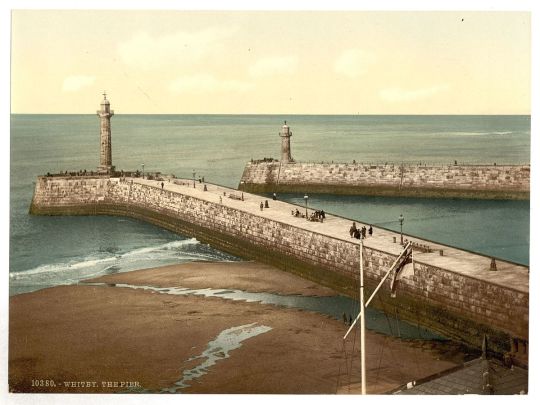
"It is nice at high water; but when the tide is out it shoals away to nothing, and there is merely the stream of the Esk, running between banks of sand, with rocks here and there."
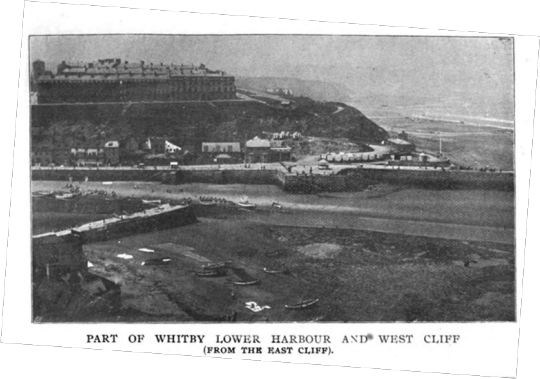
[from Horne's Guide to Whitby, 1897]
"Outside the harbour on this side there rises for about half a mile a great reef, the sharp edge of which runs straight out from behind the south lighthouse. At the end of it is a buoy with a bell, which swings in bad weather, and sends in a mournful sound on the wind. They have a legend here that when a ship is lost bells are heard out at sea."
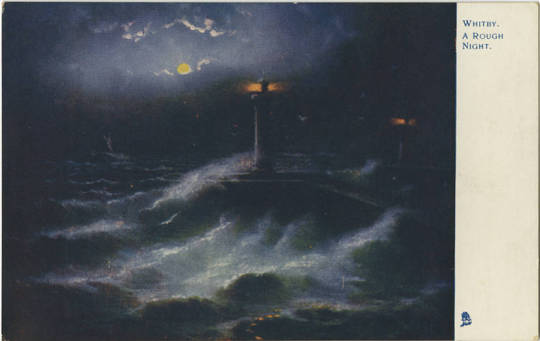
"The steps are a great feature on the place. They lead from the town up to the church, there are hundreds of them—I do not know how many—and they wind up in a delicate curve; the slope is so gentle that a horse could easily walk up and down them."

And a bonus - might Mina have bought one of these postcards for Jonathan?
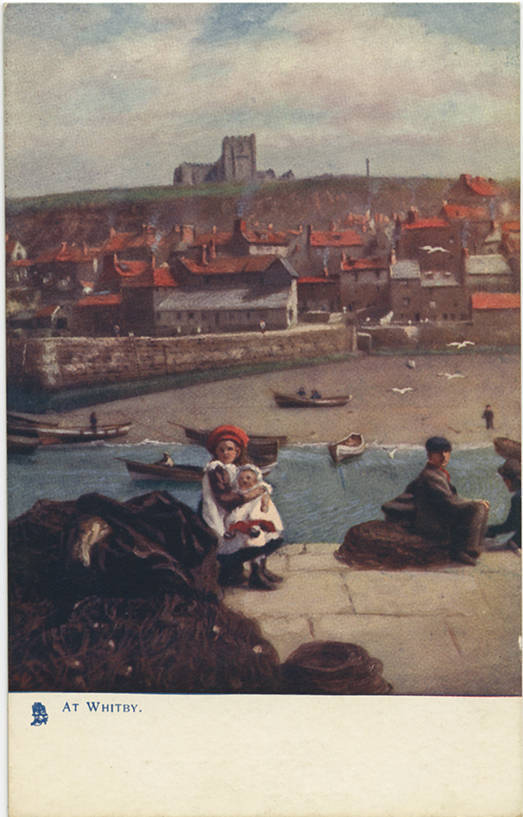
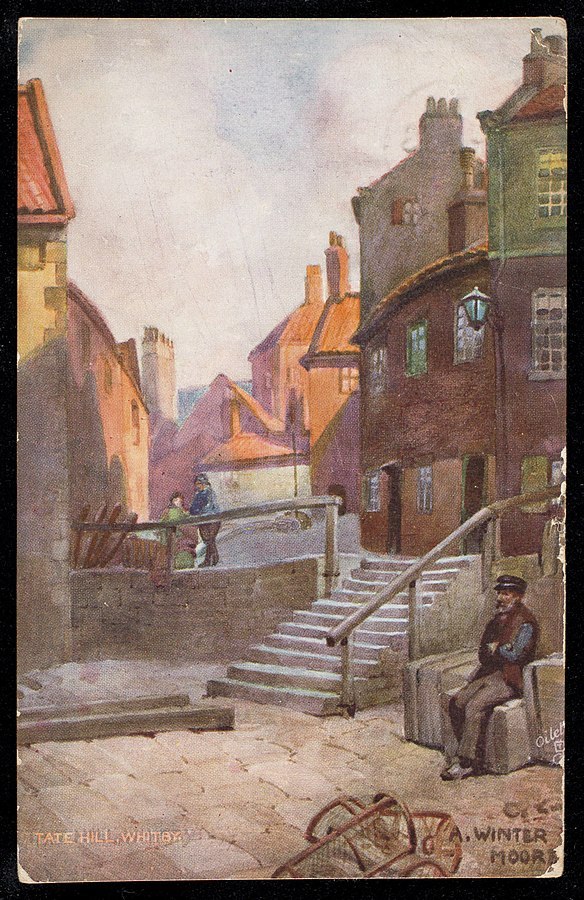
[they are from 1903, so the answer to this is "no", but again I thought they were too pretty not to include.]
#dracula daily#historical context#july 24#had this one in my drafts since may so i hope you all like it
411 notes
·
View notes
Text

A powder monkey on USS New Hampshire (a ship with an interesting history), 1864
USS New Hampshire was originally laid down in 1819 as the 74 gun ship of the line Alabama. Construction was halted before she was launched and she remained incomplete on the stocks for forty years. She was finally completed as a store ship not long before this photo was taken. After the Civil War she kicked around as a receiving and training ship for a few decades. She was decommissioned and loaned to the then new New York Naval Militia (still a thing) as a training ship in 1892. In 1905 she was renamed Granite State (to give her name to USS New Hampshire BB-25). Not long after WW1 she caught fire and sunk at her pier on the Hudson River. Raised and refloated over a year later, she was sold for breaking up. However, while being towed to her destination she caught fire again and sank on the 29th of July, 1922. Apparently her wreck makes for good, albeit cold, scuba diving.
40 notes
·
View notes
Text
Day 8 - Funeral
Fili thought Thorin had seemed fine at the funeral. Surprisingly so, in fact. He was stoic and silent, but then... that was generally Thorin's manner in public. He was surprised. Bilbo had been the lynchpin of the whole mountain, and the outpouring of grief from even the common dwarves would have been considered noteworthy for a revered king. He himself was getting through somehow - he knew that he would weep at some point, but he was the Heir, and there were Things To Do. It was the way the family of Durin handled such things. But to see even the poorest streets draped in the grey granite color of mourning, all noise muted, practically every dwarf walking hooded and silent... the hobbit had been loved, and likely more deeply than any non-dwarf ever known.
The ceremony had been as elaborate as they could make it. Bilbo would have made fun of them for how much pomp and gold there was, but Fili and Balin could only show the hobbit honor as dwarves showed it. Balin was barely holding on through the ceremony itself, a grim reminder of just how ancient he was. Once the last of the straggling mourners had trooped by, though, and the hall was empty other than the family and the tiny wooden coffin (the only insistence Bilbo had had - he must lie in wood, even if he was to be in the stone) left sitting on the stone viewing pier, Fili walked over to Thorin and put his hand on his uncle's back for comfort. It was like touching a piece of stone.
"Uncle?" Fili said softly. "The whole mountain is in mourning. We all grieve with you." There was no response. Thorin simply sat like a statue, staring at the small wooden box. They stood for a while. Fili glanced up and saw the cleaners peering round the edge of the door, and a dwarf with the cap of a mason who was almost certain to be the one tasked with preparing an appropriate sarcophagus and tomb. "The sculptor is here, uncle." There was no indication Thorin had heard him at all. For the first time, Thorin looked old, Fili realized. Not aged and distinguished, but worn and tired and beaten, as though his life had ended with Bilbo's. In a way, Fili suspected that was the case. He had occasionally wished when younger to hear the Call, but he was old enough now to know what having a One meant if they were lost. He couldn't imagine Thorin's grief right now. "Uncle?"
11 notes
·
View notes
Text
The Lost Land
I have two daughters. They are all I ever wanted from the earth. Or almost all. I also wanted one piece of ground. One city trapped by hills. One urban river. An island in its element. So I could say mine. My own. And mean it. Now they are grown up and far away and memory itself has become an emigrant, wandering in a place where love dissembles itself as landscape. Where the hills are the colours of a child’s eyes, where my children are distances, horizons. At night, on the edge of sleep, I can see the shore of Dublin Bay, its rocky sweep and its granite pier. Is this, I say how they must have seen it, backing out on the mailboat at twilight, shadows falling on everything they had to leave? And would love forever? And then I imagine myself at the landward rail of that boat searching for the last sight of a hand. I see myself on the underworld side of that water, the darkness coming in fast, saying all the names I know for a lost land. Ireland. Absence. Daughter.
~~Eavan Boland
15 notes
·
View notes
Text
Hi, I’ve never written a fanfic before but I kept thinking on loop about how Sia goes from (most likely) on Lincoln to the Sagitta to being back on Lincoln when it was almost 40 years for Dakkar, Ahlaam, and Addison.
So, here’s what will likely be the first chapter of an AO3 fic ~~once I get an account bc again, I’ve only ever read fics before~~
lmk what you think :)
((and ofc, spoilers for ep 4 / searcher))
24 hours.
That’s how long it would be before Sia saw her friends again. But for them, it would be almost forty years.
She looked out the window carved in stone to see a silver sun rising over the horizon, barely beginning to light up Lincoln, the island they had claimed as their own. A safe harbor in the storm. The corrals were coming along, and the pier was complete. Dakkar had quickly claimed the hidden grotto for his inventions. Ahlaam and Taavi had made a home inland, before his survey mission had gone wrong. Sia herself had transformed the cliffside into Granite House, which was where they now found themselves reviewing the plan one last time, the four of them.
It had been six years since the war started. Six years since she last saw Margaret. Well, last saw Margaret before she, Margaret, Dakkar, and Ahlaam had cast the spell that saved them all, and thousands more. The cost was high, Margaret’s memories including how to use her magic ways, but Margaret had insisted it was the only way.
She of course had seen Margaret since then. In her dreams, in her nightmares, and in her visions. And there was the one time, five years ago, that she and Dakkar had teleported to New York just to see her. To make sure she was okay. While it was extremely difficult, it was secretly something she knew they both needed. They need to know the plan was working, especially after she had the impossible vision. In 44 years, Margaret’s Transformation magic would return following the return of her Radiance three months before in New York.
“Time travel is exhausting,” Ahlaam huffed.
“Tell me about it,” Sia replied. Figuring out how this could all work, even with her precognitive abilities, still made her head spin. She ended up taking over part of the Grotto to fit all the calendars, much to Dakkar’s chagrin. Even he admitted, though, that her being closer to his Healing magic wasn’t the worst thing.
Ever the captain, Addison steered the conversation back to the plan they had spent the last six years formulating. “So, in an hour now that Margaret has launched the Sagitta into space, Sia will teleport to the satellite. From there, she’ll take Margaret, John and the Stratford’s to TS9, I mean, Hanover in 1874, where they will set sail on the Ellen Austin.
“In the meantime, give or take a day or 39 years, we will continue working. Ahlaam, you’ll take lead on Lincoln, while Dakkar and I continue the search for more information on the spell. I will take the Antikythera, and once Sia is back, she will transport my crew and I back to Lincoln with the Antikythera adrift in the Sargasso, leaving the orrery so Ahlaam can later send Rose… earlier?”
“You’ll see her before you see me again,” Sia chimed in. “That will be your first sign that all of this worked.”
Addison continued, “Dakkar, you will be here in Granite House to welcome her, and you have the next 39 years to figure out a way to communicate that to the rest of us.”
“Already working on it” Dakkar said quickly. Knowing him, it would be finished by tomorrow, and not Sia’s tomorrow.
“Of course you are,” Addison smiled. This was the first time their normally cheery friend had smiled this whole meeting. Nothing like planning a battle 40 years in advance to set the mood. “You and Ahlaam will then have nine days with Rose to run tests before Sia is back.
“Then, two weeks after Rose arrives, Ahlaam will transport the ships’ crew to safety before sending Rose back in time, wait we already covered that part of it, ignore that, and finally transporting the Antikythera while Sia transports Samuel, Margaret, and John on the Ellen Austin back to Lincoln.” Addison took a deep breath.
Dakkar was the first to speak, “Capital.” With that, he turned and paced over to the fire, and they knew their final meeting was adjourned.
Sia looked around at the people she had been through so much with, and her heart hurt knowing she wouldn’t be there to protect them from whatever came up over these next 39 years. Addison closed her journal, already on her way back to sea. She approached Sia, giving her a long hug, whispering “Hopefully too much of that doesn’t change in the next 39 years.”
Sia smiled into her auburn hair, darker than her own. “I have complete faith that it will.” With a final squeeze, Addison set off back to the Antikythera.
Next to her Ahlaam yawned, but tried to hide it. Sia could tell she felt guilty for not making the most of the last moments they had together for so long, and that just wouldn’t do. Sia leaned her head down onto Ahlaam’s shoulder, and whispered “Thank you.”
This startled Ahlaam, who asked, “Why are you thanking me?”
“Because I know you’ll look after Lincoln. And remind this guy to trim his beard.” They exchanged a knowing glance, eyes going back and forth between each other and the searcher who sat staring into the flames. They shared a long hug, before Sia gently pushed the thought of going home to rest into Ahlaam’s mind.
“Be seeing you.” Ahlaam was gone in a blink of an eye.
Finally, she walked over to the fire and took a seat. After a few minutes, Sia spoke.
“Her memories should be back, especially now that she’s regained another Magic Way. Is… is there anything you want me to tell her?”
“No.” Sia took a sharp breath in, knowing that wasn’t the end. He continued. “I need to do that on my own.”
“I understand.” They continued staring into the flames until the sun filled the room with light.
Dakkar looked up, for the first time all night meeting Sia’s eye. “You better go.”
“Goodbye, Nemo.” And with that, Sia transported herself to the Sagitta.
#pulp musicals#sia pulp musicals#ahlaam pulp musicals#taavi pulp musicals#dakkar pulp musicals#addison arvad#margaret cavendish#the searcher in the shadows#pulp spoilers#pulp fanfic
5 notes
·
View notes
Text

irishtimes.com
* * * *
Blackbird in Dun Laoghaire – a poem by Joseph O’Connor
Blackbird in Dun Laoghaire was read by Joseph O’Connor at the funeral of his sister Sinéad O’Connor ::
There’s a blackbird in Dun Laoghaire When I’m walking with my sons Through the laneways Called ‘The Metals’ By the train-tracks.
And he sings among the dandelions And bottle-tops and stones, Serenading purple ivy, Weary tree-trunks.
And I have it in my head That I can recognise his song, Pick him out, I mean distinct From all his flock-mates.
Impossible, I know. Heard one blackbird, heard them all. But there are times He whistles up a recollection.
There’s a blackbird in Dun Laoghaire – And I’m suddenly a kid, Asking where from here to Sandycove My youngest sister hid. I’m fourteen this Easter. My job to mind her. Good Friday on the pier – And I suddenly can’t find her.
The sky like a bruise By the lighthouse wall. We were playing hide-and-seek. Is she lost? Did she fall? There’s a blackbird in Dun Laoghaire And the terror’s like a wave Breaking hard on a hull, And the peoples’ faces grave
As Yeats on a banknote. Stern as the mansions Of Killiney in the distance, As the pier’s granite stanchions, And Howth is a drowned child Slumped in Dublin Bay, And my heart is a drum And the breakers gull-grey.
The baths. It starts raining. The People’s Park. And my tears and the terns, And the dogs’ bitter bark. There’s a blackbird in Dun Laoghaire, And I pray to him, then, For God isn’t here, In a sobbed Amen.
And she waves from the bandstand, Her hair in damp strings, And the blackbird arises With a clatter of wings From the shrubs by the teahouse, Where old ladies dream Of sailors and Kingstown And Teddy’s ice-cream.
And we don’t say a word But cling in the mizzle, And the whistle of the bird Getting lost in the drizzle. Mercy weaves her nest In the wildflowers and the leaves, There are stranger things in heaven Than a blackbird believes.
– Joseph O’Connor, 2010
26 notes
·
View notes
Text
Kollhoff towers over The Hague
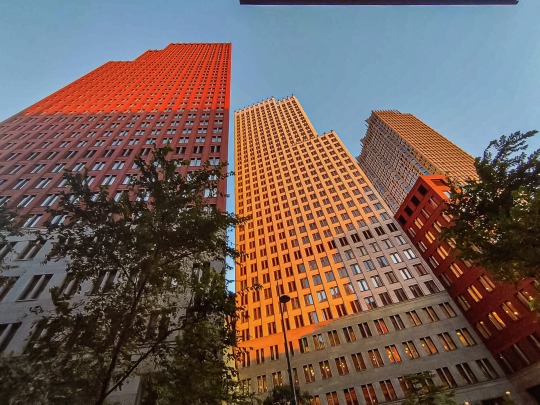
Continuation of The Hague presentation. From what I managed to grab while running. It is not without reason that he presents these shots. Firstly, the charm of autumn. Secondly. These are very famous buildings.
Kollhoff towers over The Hague. Ministry of Interior and Ministry of Justice Administration Building.
The Ministry of Internal Affairs is built of red brick, and the Ministry of Justice is covered with light granite. The towers are also called “JuBi-Gebouw”, Ju for Justitie and Bi for Binnenlandse.
The green skyscraper on the right is called “De Kroon” and was designed by Rapp + Rapp architects. At 131 m, it is slightly smaller than Kollhoff's two towers and was completed in 2011.
Two skyscrapers by Hans Kollhoff, a German architect and professor, were completed in 2012. A German architectural studio won the competition for new ministries in The Hague. Kollhoff is a representative of postmodern architecture and new classicism, as well as a hero of New Urbanism.
A pair of towers rises from the volume opening onto the promenade called Turfmarkt with the cour d'honneur cum garden. The ministry towers, with 36 floors and a height of 150 meters, stand out from the urban background with pilaster facades made of brick (for the Ministry of Interior) and granite (for the Ministry of Justice). The grey-green granite cladding of the base is made of four-centimeter-thick sandblasted slabs. These slabs are attached to the load-bearing wall with conventional stainless-steel anchors, with thermal insulation in between. In the corners of the ground floor, thicker L-shaped slabs supported by steel consoles were used.
This effectively emphasizes the expression of stability, which is also the intention of the hammered plinth. The rather flat facade of the first two floors with wide openings faces the street and connects to the ground with a curved profile, ending with a delicate course of strings. Shop windows are framed with brass-colored aluminium profiles. The second through fourth floor facades are topped by a tall main cornice that highlights the building's granite base and the shared ministries' functions. Here, the same casement windows that lie between the piers in the towers above serve as separate openings. Double windows allow natural, manually regulated ventilation throughout the building. The prefabricated facades of the towers are connected by pilasters which, covered with the same polished green granite as the base, break the upper edge of the wall and end in a crown. The connections between the elements disappear behind the overlapping panels, becoming invisible when viewed from the front.
The steeply sloping atrium, cut into the volume, has a main glazed front that overlooks the garden with revolving doors and brass-colored aluminium profiles. The garden is surrounded by a granite bench protruding from the building's plinth. This bench supports a fence made of decorative square posts and curved rectangular steel profiles coated in light anthracite. The tips are lacquered in gold.
Photo credits: @marcinwojcik
#Turfmarkt#den haag#Hague#Kollhoff#Hanz Kollhoff#JuBi Gebouw#towers#architecture#buildings#cityscape#city#city landscape#mobile#trip#fall#mobile photography
2 notes
·
View notes
Text
There’s a blackbird in Dun Laoghaire When I’m walking with my sons Through the laneways Called ‘The Metals’ By the train-tracks.
And he sings among the dandelions And bottle-tops and stones, Serenading purple ivy, Weary tree-trunks.
And I have it in my head That I can recognise his song, Pick him out, I mean distinct From all his flock-mates.
Impossible, I know. Heard one blackbird, heard them all. But there are times He whistles up a recollection.
There’s a blackbird in Dun Laoghaire – And I’m suddenly a kid, Asking where from here to Sandycove My youngest sister hid. I’m fourteen this Easter. My job to mind her. Good Friday on the pier – And I suddenly can’t find her.
The sky like a bruise By the lighthouse wall. We were playing hide-and-seek. Is she lost? Did she fall? There’s a blackbird in Dun Laoghaire And the terror’s like a wave Breaking hard on a hull, And the peoples’ faces grave
As Yeats on a banknote. Stern as the mansions Of Killiney in the distance, As the pier’s granite stanchions, And Howth is a drowned child Slumped in Dublin Bay, And my heart is a drum And the breakers gull-grey.
The baths. It starts raining. The People’s Park. And my tears and the terns, And the dogs’ bitter bark. There’s a blackbird in Dun Laoghaire, And I pray to him, then, For God isn’t here, In a sobbed Amen.
And she waves from the bandstand, Her hair in damp strings, And the blackbird arises With a clatter of wings From the shrubs by the teahouse, Where old ladies dream Of sailors and Kingstown And Teddy’s ice-cream.
And we don’t say a word But cling in the mizzle, And the whistle of the bird Getting lost in the drizzle. Mercy weaves her nest In the wildflowers and the leaves, There are stranger things in heaven Than a blackbird believes.
– Joseph O’Connor, 2010
Read at Sinead O'Connor's funeral, August 2023
2 notes
·
View notes